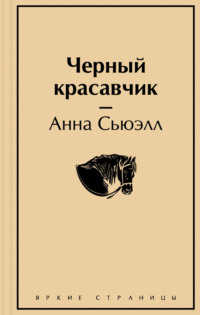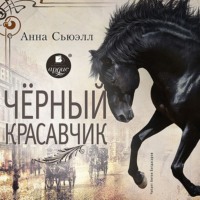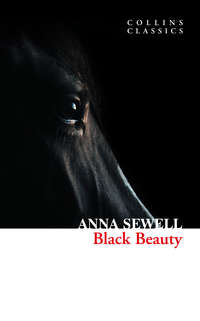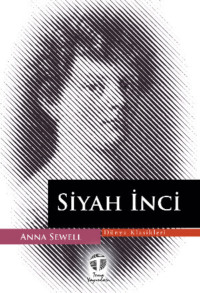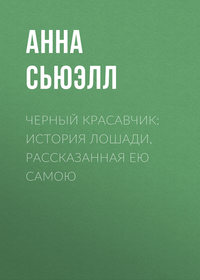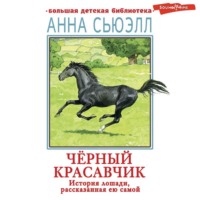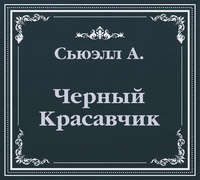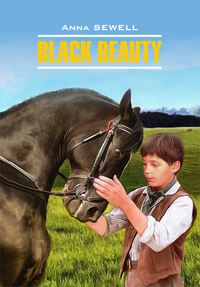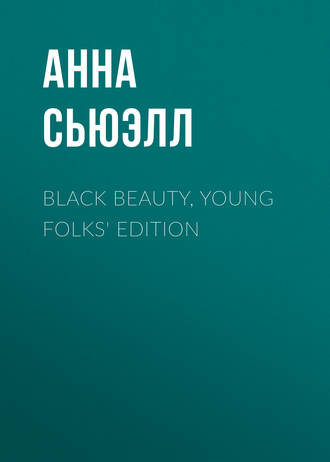 полная версия
полная версияBlack Beauty, Young Folks' Edition
MERRYLEGS
Mr. Blomefield, the vicar, had a large family of boys and girls; sometimes they used to come and play with Miss Jessie and Flora. One of the girls was as old as Miss Jessie; two of the boys were older, and there were several little ones. When they came, there was plenty of work for Merrylegs, for nothing pleased them so much as getting on him by turns and riding him all about the orchard and the home paddock, and this they would do by the hour together.
One afternoon he had been sent out with them a long time, and when James brought him in and put on his halter, he said: "There, you rogue, mind how you behave yourself, or we shall get into trouble."
"What have you been doing, Merrylegs?" I asked.
"Oh!" said he, tossing his little head, "I have only been giving those young people a lesson; they did not know when they had enough, so I just pitched them off backwards; that was the only thing they could understand."
"What?" said I, "you threw the children off? I thought you did know better than that! Did you throw Miss Jessie or Miss Flora?"
He looked very much offended, and said: "Of course not; I would not do such a thing for the best oats that ever came into the stable; why, I am as careful of our young ladies as the master could be, and as for the little ones, it is I who teach them to ride. When they seem frightened or a little unsteady on my back, I go as smooth and as quiet as old pussy when she is after a bird; and when they are all right I go on again faster, you see, just to use them to it; so don't you trouble yourself preaching to me; I am the best friend and the best riding-master those children have. It is not them, it is the boys; boys," said he, shaking his mane, "are quite different, they must be broken in, as we were broken in when we were colts, and just be taught what's what. The other children had ridden me about for nearly two hours, and then the boys thought it was their turn, and so it was, and I was quite agreeable. They rode me by turns, and I galloped them about, up and down the fields and all about the orchard, for a good hour. They had each cut a great hazel stick for a riding whip, and laid it on a little too hard; but I took it in good part, till at last I thought we had had enough, so I stopped two or three times by way of a hint. Boys think a horse or pony is like a steam engine, and can go as long and as fast as they please; they never think that a pony can get tired, or have any feelings; so as the one who was whipping me could not understand, I just rose up on my hind legs and let him slip off behind—that was all; he mounted me again, and I did the same. Then the other boy got up, and as soon as he began to use his stick, I laid him on the grass, and so on, till they were able to understand, that was all. They were not bad boys; they don't wish to be cruel. I like them very well; but you see I had to give them a lesson. When they brought me to James and told him, I think he was very angry to see such big sticks. He said they were not for young gentlemen."
"If I had been you," said Ginger, "I would have given those boys a good kick, and that would have given them a lesson."
"No doubt you would," said Merrylegs; "but then I am not quite such a fool as to anger our master or make James ashamed of me; besides, those children are under my charge when they are riding; I tell you they are entrusted to me. Why, only the other day I heard our master say to Mrs. Blomefield, 'My dear madam, you need not be anxious about the children; my old Merrylegs will take as much care of them as you or I could; I assure you I would not sell that pony for any money, he is so perfectly good-tempered and trustworthy'; and do you think I am such an ungrateful brute as to forget all the kind treatment I have had here for five years, and all the trust they place in me, and turn vicious, because a couple of ignorant boys used me badly? No, no! you never had a good place where they were kind to you, and so you don't know, and I am sorry for you; but I can tell you good places make good horses. I wouldn't vex our people for anything; I love them, I do," said Merrylegs, and he gave a low "ho, ho, ho," through his nose, as he used to do in the morning when he heard James' footstep at the door.
CHAPTER VII
GOING FOR THE DOCTOR
One night I was lying down in my straw fast asleep, when I was suddenly roused by the stable bell ringing very loud. I heard the door of John's house open, and his feet running up to the Hall. He was back again in no time; he unlocked the stable door, and came in, calling out, "Wake up, Beauty! you must go well now, if ever you did"; and almost before I could think, he had got the saddle on my back and the bridle on my head. He just ran around for his coat, and then took me at a quick trot up to the Hall door. The Squire stood there, with a lamp in his hand. "Now, John," he said, "ride for your life—that is, for your mistress' life; there is not a moment to lose. Give this note to Dr. White; give your horse a rest at the inn, and be back as soon as you can."
John said, "Yes, sir," and was on my back in a minute. The gardener who lived at the lodge had heard the bell ring, and was ready with the gate open, and away we went through the park, and through the village, and down the hill till we came to the toll-gate. John called very loud and thumped upon the door; the man was soon out and flung open the gate.
"Now," said John, "do you keep the gate open for the doctor; here's the money," and off we went again.
There was before us a long piece of level road by the river-side; John said to me, "Now, Beauty, do your best," and so I did; I wanted no whip nor spur, and for two miles I galloped as fast I could lay my feet to the ground; I don't believe that my old grandfather, who won the race at Newmarket, could have gone faster. When we came to the bridge, John pulled me up a little and patted my neck. "Well done, Beauty! good old fellow," he said. He would have let me go slower, but my spirit was up, and I was off again as fast as before. The air was frosty, the moon was bright; it was very pleasant. We came through a village, then through a dark wood, then uphill, then downhill, till after an eight miles' run, we came to the town, through the streets and into the market-place. It was all quite still except the clatter of my feet on the stones—everybody was asleep. The church clock struck three as we drew up at Dr. White's door. John rang the bell twice, and then knocked at the door like thunder. A window was thrown up, and the doctor, in his night-cap, put his head out and said, "What do you want?"
"Mrs. Gordon is very ill, sir; master wants you to go at once; he thinks she will die if you cannot get there. Here is a note."
"Wait," he said, "I will come."
He shut the window and was soon at the door. "The worst of it is," he said, "that my horse has been out all day, and is quite done up; my son has just been sent for, and he has taken the other. What is to be done? Can I have your horse?"
"He has come at a gallop nearly all the way, sir, and I was to give him a rest here; but I think my master would not be against it, if you think fit, sir."
"All right," he said; "I will soon be ready."
John stood by me and stroked my neck. I was very hot. The doctor came out with his riding-whip. "You need not take that, sir," said John; "Black Beauty will go till he drops. Take care of him, sir, if you can; I should not like any harm to come to him."
"No, no, John," said the doctor, "I hope not," and in a minute we had left John far behind.
I will not tell about our way back. The doctor was a heavier man than John, and not so good a rider; however, I did my very best. The man at the toll-gate had it open. When we came to the hill, the doctor drew me up. "Now, my good fellow," he said, "take some breath." I was glad he did, for I was nearly spent, but that breathing helped me on, and soon we were in the park. Joe was at the lodge gate; my master was at the Hall door, for he had heard us coming. He spoke not a word; the doctor went into the house with him, and Joe led me to the stable. I was glad to get home; my legs shook under me, and I could only stand and pant. I had not a dry hair on my body, the water ran down my legs, and I steamed all over—Joe used to say, like a pot on the fire. Poor Joe! he was young and small, and as yet he knew very little, and his father, who would have helped him, had been sent to the next village; but I am sure he did the very best he knew. He rubbed my legs and my chest, but he did not put my warm cloth on me; he thought I was so hot I should not like it. Then he gave me a pail full of water to drink; it was cold and very good, and I drank it all; then he gave me some hay and some corn, and, thinking he had done right, he went away. Soon I began to shake and tremble, and turned deadly cold; my legs ached, my loins ached, and my chest ached, and I felt sore all over. This developed into a strong inflammation, and I could not draw my breath without pain. John nursed me night and day. My master, too, often came to see me. "My poor Beauty," he said one day, "my good horse, you saved your mistress' life, Beauty; yes, you saved her life." I was very glad to hear that, for it seems the doctor had said if we had been a little longer it would have been too late. John told my master he never saw a horse go so fast in his life. It seems as if the horse knew what was the matter. Of course I did, though John thought not; at least I knew as much as this—that John and I must go at the top of our speed, and that it was for the sake of the mistress.
CHAPTER VIII
THE PARTING
I had lived in this happy place three years, but sad changes were about to come over us. We heard that our mistress was ill. The doctor was often at the house, and the master looked grave and anxious. Then we heard that she must go to a warm country for two or three years. The news fell upon the household like the tolling of a death-bell. Everybody was sorry. The master arranged for breaking up his establishment and leaving England. We used to hear it talked about in our stable; indeed, nothing else was talked about. John went about his work silent and sad, and Joe scarcely whistled. There was a great deal of coming and going; Ginger and I had full work.
The first of the party who went were Miss Jessie and Flora with their governess. They came to bid us good-bye. They hugged poor Merrylegs like an old friend, and so indeed he was. Then we heard what had been arranged for us. Master had sold Ginger and me to an old friend. Merrylegs he had given to the vicar, who was wanting a pony for Mrs. Blomefield, but it was on the condition that he should never be sold, and that when he was past work he should be shot and buried. Joe was engaged to take care of him and to help in the house, so I thought that Merrylegs was well off.
"Have you decided what to do, John?" he said.
"No, sir; I have made up my mind that if I could get a situation with some first-rate colt-breaker and horse-trainer, it would be the right thing for me. Many young animals are frightened and spoiled by wrong treatment, which need not be if the right man took them in hand. I always get on well with horses, and if I could help some of them to a fair start I should feel as if I was doing some good. What do you think of it, sir?"
"I don't know a man anywhere," said master, "that I should think so suitable for it as yourself. You understand horses, and somehow they understand you, and I think you could not do better."
The last sad day had come; the footman and the heavy luggage had gone off the day before, and there were only master and mistress, and her maid. Ginger and I brought the carriage up to the Hall door, for the last time. The servants brought out cushions and rugs, and when all were arranged, master came down the steps carrying the mistress in his arms (I was on the side next the house, and could see all that went on); he placed her carefully in the carriage, while the house servants stood round crying.
"Good-bye, again," he said; "we shall not forget any of you," and he got in. "Drive on, John." Joe jumped up and we trotted slowly through the park and through the village, where the people were standing at their doors to have a last look and to say, "God bless them."
When we reached the railway station, I think mistress walked from the carriage to the waiting-room. I heard her say in her own sweet voice, "Good-bye, John; God bless you." I felt the rein twitch, but John made no answer; perhaps he could not speak. As soon as Joe had taken the things out of the carriage, John called him to stand by the horses, while he went on the platform. Poor Joe! He stood close up to our heads to hide his tears. Very soon the train came puffing into the station; then two or three minutes, and the doors were slammed to; the guard whistled and the train glided away, leaving behind it only clouds of white smoke and some very heavy hearts.
When it was quite out of sight, John came back. "We shall never see her again," he said—"never." He took the reins, mounted the box, and with Joe drove slowly home; but it was not our home now.
CHAPTER IX
EARLSHALL
The next morning after breakfast, Joe put Merrylegs into the mistress' low chaise to take him to the vicarage; he came first and said good-bye to us, and Merrylegs neighed to us from the yard. Then John put the saddle on Ginger and the leading rein on me, and rode us across the country to Earlshall Park, where the Earl of W– lived. There was a very fine house and a great deal of stabling. We went into the yard through a stone gateway, and John asked for Mr. York. It was some time before he came. He was a fine-looking, middle-aged man, and his voice said at once that he expected to be obeyed. He was very friendly and polite to John, and after giving us a slight look, he called a groom to take us to our boxes, and invited John to take some refreshment.
We were taken to a light, airy stable, and placed in boxes adjoining each other, where we were rubbed down and fed. In about half an hour John and York, who was to be our new coachman, came in to see us.
"Now, Manly," he said, after carefully looking at us both, "I can see no fault in these horses; but we all know that horses have their peculiarities as well as men, and that sometimes they need different treatment. I should like to know if there is anything particular in either of these that you would like to mention."
"Well," said John, "I don't believe there is a better pair of horses in the country, and right grieved I am to part with them, but they are not alike. The black one is the most perfect temper I ever knew; I suppose he has never known a hard word or blow since he was foaled, and all his pleasure seems to be to do what you wish; but the chestnut, I fancy, must have had bad treatment; we heard as much from the dealer. She came to us snappish and suspicious, but when she found what sort of place ours was, it all went off by degrees; for three years I have never seen the smallest sign of temper, and if she is well treated there is not a better, more willing animal than she is. But she has naturally a more irritable constitution than the black horse; flies tease her more; anything wrong in her harness frets her more; and if she were ill-used or unfairly treated she would not be unlikely to give tit for tat. You know that many high-mettled horses will do so."
"Of course," said York, "I quite understand; but you know it is not easy in stables like these to have all the grooms just what they should be. I do my best, and there I must leave it. I'll remember what you have said about the mare." They were going out of the stable, when John stopped, and said, "I had better mention that we have never used the check-rein with either of them; the black horse never had one on, and the dealer said it was the gag-bit that spoiled the other's temper."
"Well," said York, "if they come here, they must wear the check-rein. I prefer a loose rein myself, and his lordship is always very reasonable about horses; but my lady—that's another thing; she will have style, and if her carriage horses are not reined up tight she wouldn't look at them. I always stand out against the gag-bit, and shall do so, but it must be tight up when my lady rides!"
"I am sorry for it," said John; "but I must go now, or I shall lose the train."
He came round to each of us to pat and speak to us for the last time; his voice sounded very sad. I held my face close to him; that was all I could do to say good-bye; and then he was gone, and I have never seen him since.
The next day Lord W– came to look at us; he seemed pleased with our appearance. "I have great confidence in these horses," he said, "from the character my friend Gordon has given me of them. Of course they are not a match in color, but my idea is that they will do very well for the carriage while we are in the country. Before we go to London I must try to match Baron; the black horse, I believe, is perfect for riding."
York then told him what John had said about us.
"Well," said he, "you must keep an eye to the mare, and put the check-rein easy; I dare say they will do very well with a little humoring at first. I'll mention it to your lady."
In the afternoon we were harnessed and put in the carriage and led round to the front of the house. It was all very grand, and three times as large as the old house at Birtwick, but not half so pleasant, if a horse may have an opinion. Two footmen were standing ready,¸ dressed in drab livery, with scarlet breeches and white stockings. Presently we heard the rustling sound of silk as my lady came down the flight of stone steps. She stepped round to look at us; she was a tall, proud-looking woman, and did not seem pleased about something, but she said nothing, and got into the carriage. This was the first time of wearing a check-rein, and I must say, though it certainly was a nuisance not to be able to get my head down now and then, it did not pull my head higher than I was accustomed to carry it. I felt anxious about Ginger, but she seemed to be quiet and content.
The next day we were again at the door, and the footmen as before; we heard the silk dress rustle, and the lady came down the steps, and in an imperious voice, she said, "York, you must put those horses' heads higher, they are not fit to be seen."
York got down, and said very respectfully, "I beg your pardon, my lady, but these horses have not been reined up for three years, and my lord said it would be safer to bring them to it by degrees; but, if your ladyship pleases, I can take them up a little more." ¸ "Do so," she said.
York came round to our heads and shortened the rein himself, one hole, I think. Every little makes a difference, be it for better or worse, and that day we had a steep hill to go up. Then I began to understand what I had heard of. Of course, I wanted to put my head forward and take the carriage up with a will as we had been used to do; but no, I had to pull with my head up now, and that took all the spirit out of me, and the strain came on my back and legs. When we came in, Ginger said, "Now you see what it is like; but this is not bad, and if it does not get much worse than this I shall say nothing about it, for we are very well treated here; but if they strain me up tight, why, let 'em look out! I can't bear it, and I won't."
Day by day, hole by hole, our bearing-reins were shortened, and instead of looking forward with pleasure to having my harness put on, as I used to do, I began to dread it. Ginger too seemed restless, thought she said very little. The worst was yet to come.
CHAPTER X
A STRIKE FOR LIBERTY
One day my lady came down later than usual, and the silk rustled more than ever. "Drive to the Duchess of B–'s," she said, and then after a pause, "Are you never going to get those horses' heads up, York? Raise them at once, and let us have no more of this humoring nonsense."
York came to me first, while the groom stood at Ginger's head. He drew my head back and fixed the rein so tight that it was almost ¸intolerable; then he went to Ginger, who was impatiently jerking her head up and down against the bit, as was her way now. She had a good idea of what was coming, and the moment York took the rein off the turret in order to shorten it, she took her opportunity, and reared up so suddenly that York had his nose roughly hit and his hat knocked off; the groom was nearly thrown off his legs. At once they both flew to her head, but she was a match for them, and went on plunging, rearing, and kicking in a most desperate manner; at last she kicked right over the carriage pole and fell down, after giving me a severe blow on my near quarter. There is no knowing what further mischief she might have done, had not York sat himself down flat on her head to prevent her struggling, at the same time calling out, "Unbuckle the black horse! Run for the winch and unscrew the carriage pole! Cut the trace here, somebody, if you can't unhitch it!" The groom soon set me free from Ginger and the carriage, and led me to my box. He just turned me in as I was, and ran back to York. I was much excited by what had happened, and if I had ever been used to kick or rear I am sure I should have done it then; but I never had, and there I stood, angry, sore in my leg, my head still strained up to the terret on the saddle, and no power to get it down. I was very miserable, and felt much inclined to kick the first person who came near me.
Before long, however, Ginger was led in by two grooms, a good deal knocked about and bruised. York came with her and gave us orders, and then came to look at me. In a moment he let down my head.
"Confound these check-reins!" he said to himself; "I thought we should have some mischief soon. Master will be sorely vexed. But here, if a woman's husband can't rule her, of course a servant can't; so I wash my hands of it, and if she can't get to the Duchess' garden party I can't help it."
York did not say this before the men; he always spoke respectfully when they were by. Now he felt me all over, and soon found the place above my hock where I had been kicked. It was swelled and painful; he ordered it to be sponged with hot water, and then some lotion was put on.
Lord W– was much put out when he learned what had happened; he blamed York for giving way to his mistress, to which he replied that in future he would much prefer to receive his orders only from his lordship. I thought York might have stood up better for his horses, but perhaps I am no judge.
Ginger was never put into the carriage again, but when she was well of her bruises one of Lord W–'s younger sons said he should like to have her; he was sure she would make a good hunter. As for me, I was obliged still to go in the carriage, and had a fresh partner called Max; he had always been used to the tight rein. I asked him how it was he bore it.
"Well," he said, "I bear it because I must; but it is shortening my life, and it will shorten yours too, if you have to stick to it."
"Do you think," I said, "that our masters know how bad it is for us?"
"I can't say," he replied, "but the dealers and the horse-doctors know it very well. I was at a dealer's once, who was training me and another horse to go as a pair; he was getting our heads up, and he said, a little higher and a little higher every day. A gentleman who was there asked him why he did so. 'Because,' said he, 'people won't buy them unless we do. The fashionable people want their horses to carry their heads high and to step high. Of course, it is very bad for the horses, but then it is good for trade. The horses soon wear up, and they come for another pair.' That," said Max, "is what he said in my hearing, and you can judge for yourself."
What I suffered with that rein for four months in my lady's carriage would be hard to describe; but I am quite sure that, had it lasted much longer, either my health or my temper would have¸ given way. Before that, I never knew what it was to foam at the mouth, but now the action of the sharp bit on my tongue and jaw, and the constrained position of my head and throat, always caused me to froth at the mouth more or less. Some people think it very fine to see this, and say, "What fine, spirited creatures!" But it is just as unnatural for horses as for men to foam at the mouth; it is a sure sign of some discomfort, and should be attended to. Besides this, there was a pressure on my windpipe, which often made my breathing very uncomfortable; when I returned from my work, my neck and chest were strained and painful, my mouth and tongue tender, and I felt worn and depressed.


